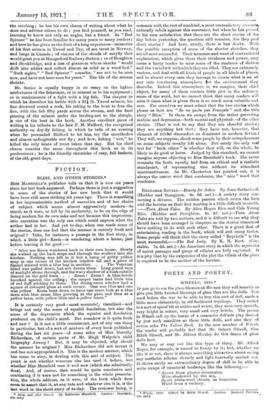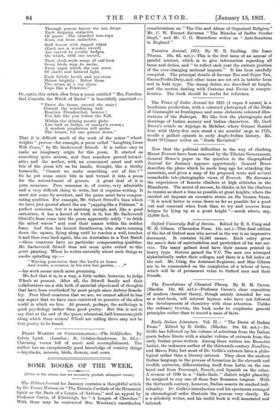POETS AND POETRY.
WHEELS. 1920.*
IF you go to see the glass-blowers at Murano they will sometimes give you little twisted blowings of glass that are like dolls. You used before the war to be able to buy this sort of doll, made a little more elaborately, in old-fashioned toyshops. They ended in a sort of spiral bit-at ankles and wrists, they wore very smooth, very bright in colour, very small and very brittle. The poems in Wheels call up the image of a commedia d,ell'arte play danced by just such manikins as these little dolls, and also they of course echo The Yellow Book. In the new number of W heels the reader will probably feel that Mr. Osbert Sitwell, Miss
Edith Sitwell, and Mr. Aldous Huxley do this dance of glass dolls best.
We- may or may not like this type of thing. Mr. Alfred Noyes, for example, is roused to frenzy by it; but, whether we like it or not, there is always something attractive about seeing any aesthetio scheme cleverly and light-heartedly carried out. It shows surely an extraordinary degree of skill to be able to write scraps of unnatural landscape like the following :—
" Above from plaster-mountains, Wine-shadowed by the sea,
Spurt white-wool clouds, as fountains
Whirl from a rockery.
•
• Wheels, 1920. Edited by Edith Sitwell. London: Leonard Parion:: tea. net.]
Through porous leaves the sun drops Each dripping stalactite Of green. The chiselled tree-tops Seem cut from malachite.
Stiff leaves with ragged edges (Each one a wooden sword) Are carved to prickly hedges, On which, with one accord.
Their clock-work songs of calf-love Stout birds stop to recite, From cages which the sun wove Of shade and latticed light.
Each brittle booth and joy-store Shines brightly. Below these The ocean at a toy shore Yaps like a Pekinese."
Or, again, this satiric idea from a poem entitled " Mrs. Freuden- thal Consults the Witch of Endor " is beautifully executed :- " Enter the house, ascend the stair ! Consult the scintillating ball. Beatrice Freudenthal, beware ! Eve felt like you before the Fall.
Within the shining mystic globe Lies luck at bridge, or martyr's crown ; A modern prophetess will probe The future, for one guinea down."
That it is difficult much of the work of the minor " wheel- wrights " proves—for example, a poem called "Laughing Lions Will Come," by Mr. Sacheverell Sitwell. It is rather easy to make an imaginary origin for this poem. It started as something quite serious, and then somehow proved intract- able; and the author, with an economical mind and with bits of the poem left on his hands, thought, like a thrifty housewife, " Cannot we make something out of this ? " So he put some comic bits in and turned it into a poem for the astonishment of grocers. A great deal of it is pure nonsense. Pure nonsense is, of course, very admirable and a very difficult thing to write, but it requires writing. It must not come by accident, and the poem must have compen- sating qualities. For example, Mr. Osbert Sitwell's lines which we have just quoted about the sea "yapping like a Pekinese" is perfect nonsense, but it is amusing enough, and, like a good caricature, it has a kernel of truth in it, but Mr. Sacheverell Sitwell's lions come into the poem apparently solely " to drink the salted waves " and cool their manes within the sudden foam. And then his hermit Zarathustra, who starts running down the square, flying along until he reaches a wall, touches it and then runs back again, like an Australian in a Test Match —these creatures have no particular compensating qualities. Mr. Sacheverell Sitwell does not seem quite suited to this genre painting. When he writes naturally about such things as smoke spiralling up :-
"Waving possession that the lord's at home And works, a creator, in his own fair garden . ,,
—his work seems much more promising.
We feel that it is, in a way, a little unfair, however, to judge Wheels at present. After all, the Sitwell family and their collaborators see a side both of material objects and of thoughts that have been overlooked by most people since Aubrey Beards- ley. Poor blind creatures that we are, we cannot afford to lose any aspect that we have once contrived to perceive of the alien world in which we live. At present, perhaps, the anthology is good psychology rather than good poetry. But this is not to say that at the end of the queer, whimsical, half-humorous path along which these writers' Wheels are rolling there may not be true poetry to be found.































 Previous page
Previous page